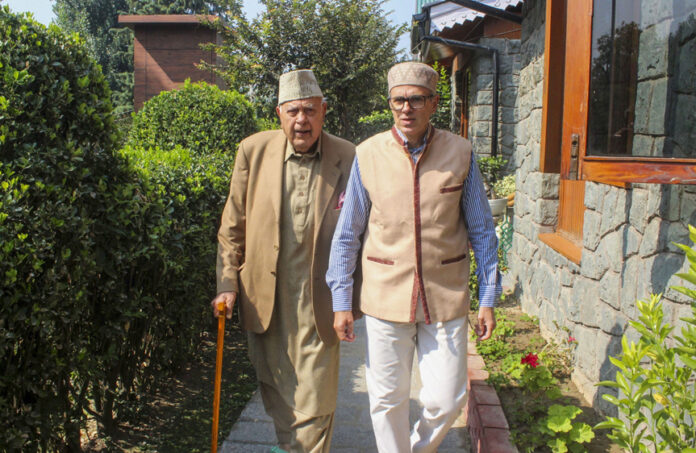DOGRA HERALD BUREAU
SRINAGAR, Jan 1
Jammu and Kashmir got an elected government after six years in 2024 but statehood remained elusive as a hybrid model of governance kept hampering full restoration of democratic rule.
The assembly elections in Jammu and Kashmir — held after a gap of 10 years — had many firsts associated with them.
The polls were the first since the abrogation of Article 370, the first for Jammu and Kashmir in its Union Territory set up, and the first since the outbreak of militancy in which cadre of the banned Jamaat-e-Islami, a socio-religious party, participated.
It was also the first election in which one party almost managed a majority on its own, with the National Conference — which ran a campaign on the restoration of special status to Jammu and Kashmir — won 42 seats in the 90-member House.
National Conference leader Omar Abdullah became only the fourth Jammu and Kashmir leader to be sworn in as chief minister for a second term. The other three leaders to achieve the feat were his grandfather Sheikh Mohammad Abdullah, father Farooq Abdullah, and Mufti Mohammad Sayeed of the People’s Democratic Party (PDP).
The BJP emerged as the second largest party and cemented its vote bank in Jammu, bagging 29 of the region’s 43 seats. However, the saffron party yet again drew a blank in the valley.
The Congress, which was hoping to improve its performance in the Jammu region, drew a blank in Hindu-dominated areas. The party won six seats — five from the valley and one from Muslim-dominated Rajouri.
The PDP fared the worst among the mainstream parties, managing just just three seats against the 28 it won in the 2014 polls.
The launch of former chief minister Mehbooba Mufti’s daughter Iltija Mufti into electoral politics from the family’s Bijbehara bastion also failed.
In Jammu, the BJP’s then-Jammu and Kashmir unit president Ravinder Raina — once tipped to be the saffron party’s chief ministerial candidate — was humbled in the polls.
The assembly elections witnessed massive participation even in areas known for poll boycotts. Several former separatist leaders or their relatives contested the elections.
The resentment against the reading down of Article 370 favoured the National Conference as its tally of seats rose almost three times against the 15 it had in 2014.
Sticking to its electoral promises, the National Conference government passed a resolution for restoration of statehood in the first Cabinet meeting and followed it with a momentous assembly resolution for restoration of special status.
Expectedly, the BJP created ruckus in the assembly over the resolution’s passage.
Speaker Abdul Rahim Rather had to order more than a dozen BJP MLAs to be marshalled out to complete the businesses listed for the five-day session.
It was also the first time since 1987 that assembly elections in Jammu and Kashmir were held in just three phases.
Earlier in the year, the Lok Sabha polls threw up a few surprises in the valley but the two seats in Jammu went according to script.
Union minister Jitendra Singh and his BJP colleague Jugal Kishore Sharma both won third consecutive terms in the Lok Sabha.
The biggest shock, however, was the loss of Omar Abdullah from Baramulla to jailed leader Sheikh Abdul Rashid. Local strongman Sajad Gani Lone was also swept by the wayside as Rashid’s sons ran an emotional campaign to “save our father from the gallows”.
PDP president Mehbooba Mufti also suffered a setback, losing her second consecutive Lok Sabha election — this time to Main Altaf Ahmad Larvi, a prominent Gujjar leader, who was a reluctant candidate but gave in to the wishes of the National Conference brass.
Aga Ruhullah of the National Conference was also elected to the Lok Sabha, defeating terror-accused PDP leader Waheed Para from Srinagar.
Ruhullah has since emerged as the ruling National Conference’s moral beacon, issuing statements from time to time to remind his party of its pre-election promises.
The Srinagar MP even participated in a sit-in outside the chief minister’s residence in support of the demand for rationalisation of quotas in the reservation policy.
While new players are emerging in the political landscape, some of the past masters might have played their last electoral innings.
National Conference president and former chief minister Farooq Abdullah did not contest either election.
Although former Congress leader Ghulam Nabi Azad is now leading his own outfit, the party already seems to be disintegrating.
The Democratic Progressive Azad Party had announced that Azad, a former chief minister, would contest the Lok Sabha elections from Anantnag-Rajouri.
However, he pulled out within days.
Azad rarely campaigned during the assembly polls due to ill health and his party failed to win a single seat.
On the governance front, Omar Abdullah and his Cabinet colleagues are coming to terms with their curtailed powers as Lieutenant Governor Manoj Sinha — a central government appointee — holds most key decision-making powers.
The elected government does not have any say in the functioning of the home department, which is controlled by the lieutenant governor.
The popular government also cannot transfer or take any action against Indian Administrative Service (IAS) officers.
The security situation was by and large peaceful in Jammu and Kashmir despite terrorists managing to carry out some daring attacks, especially in the Jammu region.
The ultras carried out attacks in the Udhampur, Kathua, Poonch and the Rajouri districts of Jammu, besides attacking security forces and vital infrastructure projects in Kashmir.
The deadliest attack was carried out at a tunnel construction site in Gagangir of Kashmir’s Ganderbal district in which seven people — six migrant labourers and one local doctor — were killed.



























